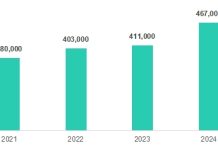A recent study by the International Workplace Group (IWG) found that 91% of CEOs have adopted hybrid working, with 75% reporting improvements in productivity and 76% noting better staff retention. The study, which surveyed over 500 CEOs, indicates that 74% do not consider full-time office attendance a business priority.
These findings align with previous IWG reports, where 100% of HR leaders believed hybrid work contributes to a happier and more loyal workforce. The research highlights that hybrid working has enhanced company culture for three-quarters of respondents, with 77% seeing improved employee engagement and 75% noting more efficient team collaboration.
With the upcoming Tripartite Guidelines on Flexible Work Arrangements (FWAs) set to take effect this December, businesses are increasingly adopting flexible work practices. In Singapore, 37% of companies have implemented hybrid work, with 67% of workers enjoying flexible arrangements.
This shift is corroborated by research from The Bank of England, Stanford University, King’s College London, and Nottingham University, showing that hybrid working boosts firm productivity by approximately US$19,000 per employee annually.
The ability to offer hybrid work is now essential for attracting and retaining top talent. Over 73% of CEOs reported that hybrid work has helped them hire the best candidates, and 71% have accessed a more diverse talent pool.
A separate study in Singapore found that nearly half of hiring managers consider work flexibility crucial for talent attraction, with 56% of employees in full-time office roles actively seeking new jobs compared to 41% of hybrid workers.
Despite some companies mandating full-time office attendance, 74% of CEOs believe this is not a priority. Nearly two-thirds think they would lose talented staff if they enforced full-time office presence. Instead, businesses are investing in hybrid work infrastructure, with 94% investing in new technology and 43% prioritizing it over the past year.
The trend towards hybrid working is expected to grow, with an estimated 1.2 billion white-collar workers globally and a total addressable market of over US$2 trillion. CEOs of hybrid businesses have reported increased employee happiness, productivity, and retention, with 74% expecting to operate hybrid models in five years.
Mark Dixon, CEO of IWG, stated: “The uptake of hybrid working is continuing to increase as companies of all sizes understand its importance in creating an optimal environment for both the productivity of the business and the happiness of its employees to thrive.
“This latest research demonstrates that CEOs appreciate the critical role that hybrid working has in attracting and retaining the highest quality talent.”
IWG, the world’s largest provider of hybrid working solutions, expanded to 867 new locations globally last year to meet the growing demand for hybrid working.















